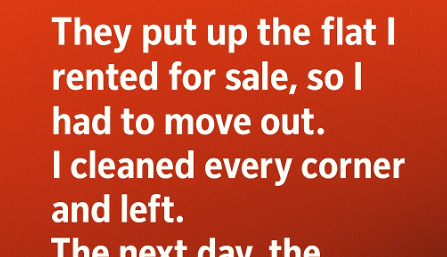The owners listed the apartment I had been renting on the market, which meant I needed to vacate the space. I scrubbed every surface and departed. The following morning, the landlady reached out by phone. My heart raced with worry that they had discovered some damage. Instead, she began expressing gratitude for the thorough cleaning I performed. Then she asked in a tone of true curiosity, “Why do you show such kindness and respect when many others would depart leaving chaos behind?” Her words carried a note of authentic wonder, tinged with emotion.
I responded with a gentle chuckle and shared that my upbringing taught me to exit any environment in a state superior to how I encountered it. I described how that modest dwelling served as my sanctuary during critical times — upon relocating for employment, arriving in an unfamiliar urban landscape without acquaintances, and navigating periods of instability. For me, the act of cleaning represented far more than obligation. It formed a subtle expression of appreciation. She paused in silence, evidently taken aback that an ordinary residence held such profound significance.
Following that, she revealed details I could not have anticipated. The individual who occupied the unit before me abandoned it in deplorable shape — shattered cabinetry, marred flooring, and marred partitions. That person offered no remorse and ignored all attempts at communication. She confessed that experiences like this led her to assume all tenants shared similar traits — negligent, hurried, and indifferent to the value of surroundings. However, she emphasized that my conduct altered her perspective entirely. “Your approach has shown me that individuals who truly value things still exist,” she murmured softly.
Once the conversation ended, I settled into my recently acquired residence amid stacks of cartons and the ambiguity of beginning anew. Society moves at a rapid pace, with individuals frequently hastening onward, discarding elements that cease to benefit them. Yet acts of consideration possess a subtle strength — they endure, warm spirits, and occasionally mend unspoken letdowns. I received no tangible reward for tidying that dwelling, but I experienced a deeper sense of fulfillment upon learning a basic gesture renewed another person’s belief in humanity. Often, the positive impacts we create remain unseen — until a voice on the line acknowledges their presence.
To expand on this moment, consider how small gestures ripple outward in everyday life. In the hustle of modern routines, where deadlines dominate and connections feel fleeting, choosing to invest effort in spaces we temporarily inhabit speaks volumes about character. That apartment, with its compact kitchen where I prepared countless meals after long workdays, the cozy bedroom that sheltered me through sleepless nights of adjustment, and the living area that hosted quiet evenings of reflection, became more than walls and fixtures. It transformed into a foundation during transition, a steady anchor amid change.
Reflecting further, the landlady’s initial assumptions stemmed from repeated disappointments. Imagine the frustration of entering a property expecting readiness for the next occupant, only to face repairs and replacements. Broken shelves require carpentry skills or professional help, stained carpets demand deep extraction methods or full removal, and damaged walls involve patching, sanding, and repainting. Each instance erodes trust, building a narrative that renters prioritize convenience over accountability. My decision to leave the place immaculate countered that pattern, demonstrating that respect extends beyond contractual terms.
This exchange highlights the importance of mindfulness in transitions. When moving, people pack belongings, update addresses, and redirect mail, but overlooking the emotional imprint on a space misses an opportunity. Cleaning thoroughly — wiping down appliances, sweeping floors, organizing cabinets — ensures the next person starts on a positive note. It fosters a cycle of positivity, where one thoughtful departure encourages the incoming resident to maintain standards.
Moreover, such actions align with broader principles of stewardship. Whether renting a home, borrowing a tool, or using a public facility, treating items with care preserves resources for future use. In an era of disposable culture, where items are replaced rather than repaired, intentional upkeep stands out. It models behavior for children, colleagues, and strangers, subtly influencing communal norms.
The landlady’s emotional response underscores how kindness bridges gaps. Her voice, initially formal, softened as the conversation progressed, revealing vulnerability beneath a professional exterior. Landlords manage properties, handle finances, and coordinate maintenance, yet they remain human, affected by interactions. A single positive experience can shift entrenched views, reminding them that generalizations fail to capture individual diversity.
In my new surroundings, unpacking boxes evoked similar sentiments. Each item placed carried memories from the previous home — a mug from a local market, books that accompanied solitary dinners, plants that thrived on the windowsill. Arranging them anew felt like honoring past chapters while embracing the unknown. The uncertainty of fresh starts brings excitement mixed with apprehension: new routes to work, unfamiliar neighbors, unexplored neighborhoods. Yet grounding these changes in gratitude transforms potential stress into growth.
Kindness, in its quiet form, accumulates over time. It appears in returning a shopping cart properly, holding a door for someone laden with bags, or leaving a workspace organized for the next shift. These moments, uncelebrated, weave into the fabric of society, countering cynicism. Research in psychology supports this; studies on prosocial behavior show that witnessing or receiving benevolence increases likelihood of reciprocation, creating upward spirals in communities.
Expanding on personal growth, my habit of leaving places improved traces back to family influences. Parents emphasized responsibility, teaching that borrowed items return cleaner, visited homes depart tidier. These lessons ingrained a sense of duty, extending to professional environments where I ensure shared offices remain orderly, or vacation rentals receive thorough attention before checkout. Colleagues notice, guests appreciate, and over years, it builds reputation.
The landlady’s call arrived unexpectedly, interrupting morning coffee in the midst of settling in. Her praise validated the effort, turning a routine task into a meaningful exchange. It prompted reflection on other instances where similar choices yielded intangible rewards — a note from a hotel housekeeper, a smile from a coworker, a landlord’s reference for future applications.
To illustrate further, envision the apartment’s transformation. Upon entry months prior, it featured neutral tones, functional layout, basic amenities. I added personal touches: curtains for privacy, rugs for warmth, artwork on walls. Maintaining cleanliness involved weekly routines — dusting shelves, mopping tiles, laundering linens. Departure required reversing enhancements while elevating the base condition: polishing fixtures until they gleamed, vacuuming crevices, erasing any signs of occupancy.
This process, though time-consuming, provided closure. It allowed farewell to the space that witnessed achievements like promotions, challenges such as homesickness, joys including virtual gatherings with distant family. Cleaning became ritual, a meditative practice acknowledging the role the apartment played.
The broader implication involves empathy in transactions. Renters and landlords operate in a contractual relationship, yet infusing humanity elevates it. Understanding mutual pressures — tenants juggle finances and relocations, owners manage investments and upkeep — promotes cooperation. My story exemplifies how one side’s consideration eases the other’s burden.
In conclusion, while the world accelerates with technology and demands, pausing for thoughtful acts remains powerful. They require no grand resources, only intention. The landlady’s restored faith, my enriched spirit, and the pristine apartment ready for its next chapter all stem from that choice. Goodness often travels unseen, but when acknowledged, it illuminates paths forward, encouraging continuation of the cycle.







